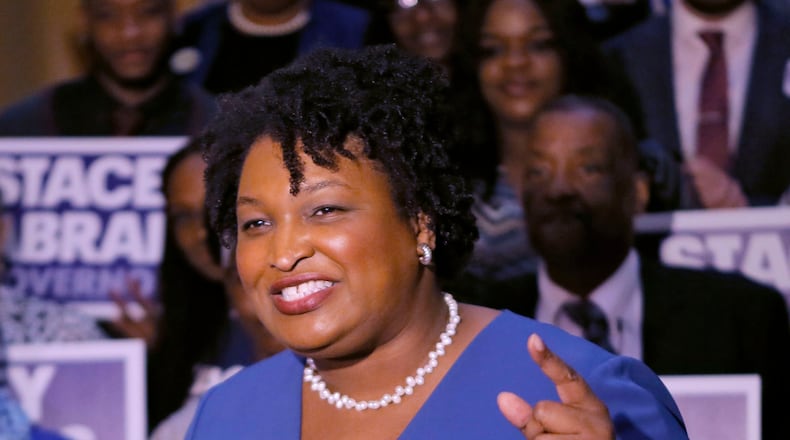Stacey Abrams issued a forceful plea Monday for national Democrats to compete in Georgia in 2020 with two U.S. Senate races on the ballot and a chance to carry the state in the presidential race for the first time in more than two decades.
In a memo ricocheting around Washington, the party’s 2018 gubernatorial nominee wrote that “any less than full investment in Georgia would amount to strategic malpractice” and challenged the party to “do better and go big” next year.
It was sent to reinforce the growing sentiment that Georgia will be a 2020 political battleground, particularly now that U.S. Sen. Johnny Isakson's decision to step down at year's end means that Republicans must defend two Senate seats next year.
In the 16-page memo, Abrams and her top aide Lauren Groh-Wargo urged Democrats to shun “false choices” between chasing more moderate white voters and left-leaning minorities who often skip elections.
“We do not lose winnable white voters because we engage communities of color,” read the memo, sent to 2020 White House hopefuls and Democratic strategists. “We do not lose urban votes because we campaign in rural areas.”
The memo also pushed back on the notion that Abrams is the only candidate who could bring Republicans to the verge of defeat – she lost to Gov. Brian Kemp by roughly 55,000 votes – with the case that her strategy can be advanced by any “aggressive, authentic candidate and campaign.”
The memo was sent weeks after Isakson’s decision upended state politics by forcing Republicans to defend two U.S. Senate seats in Georgia. Three Democrats have already announced challenges to Sen. David Perdue, a first-term Republican.
It also comes amid a growing debate over how Democrats can win back the White House. Some strategists want to win back moderate white voters in the Midwest, while others want to put Georgia and other Sun Belt states in play by appealing to minorities and college-educated suburban women.
The playbook includes charts that outline where Democrats can make gains in 2020, particularly in metro Atlanta counties where hundreds of thousands of African-American voters skipped the midterm. In Fulton alone, it said, an estimated 134,000 registered black voters didn't cast ballots in 2018.
Groh-Wargo wrote that the cost of competing in Georgia, where the Abrams campaign and the state party combined to spend $42 million in 2018, is cheaper than other battleground states. She singled out Ohio, where Hillary Clinton lost by 8 points despite a $70 million investment.
The memo also tried to dispel an "assumed narrative that Abrams did poorly among white voters," with data showing her estimated support among white residents jumped by double-digits in some urban and suburban counties. (She struggled dearly in rural areas, where Kemp made big gains.)
And it urged national party leaders and candidates to “invest big and invest early” in field programs that target likely supporters and a smaller pool of swing voters to try to win Georgia in the presidential race for the first time since Bill Clinton carried the state in 1992.
“The infrastructure laid by the Abrams campaign is a foundation to 2020 campaigns to scale in order to seize this moment. The playbook has been drafted for victory next year,” the memo read.
“Now it is up to the 2020 candidates, committees and all interested and invested parties to expand on these efforts and what we’ve learned to win next year.”
About the Author
The Latest
Featured




